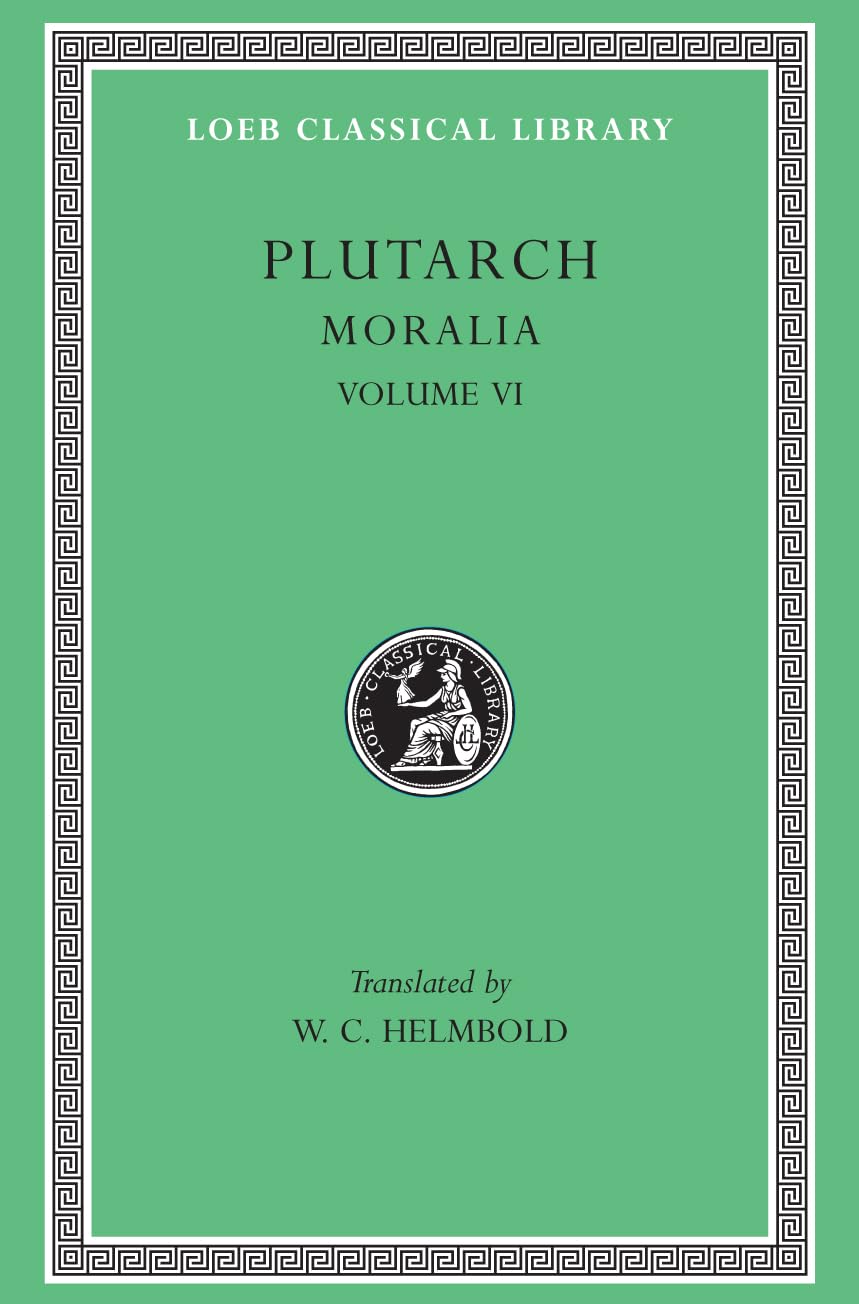1
/
of
1
Blue Vase Books
Moralia, Volume VI: Can Virtue Be Taught? On Moral Virtue. On the Control of Anger. On Tranquility of Mind. On Brotherly Love. On Affection for Offspring. Whether Vice Be Sufficient to Cause Unhappiness. Whether the Affe... - 6296
Moralia, Volume VI: Can Virtue Be Taught? On Moral Virtue. On the Control of Anger. On Tranquility of Mind. On Brotherly Love. On Affection for Offspring. Whether Vice Be Sufficient to Cause Unhappiness. Whether the Affe... - 6296
Regular price
$24.78
Regular price
Sale price
$24.78
Unit price
/
per
In stock
Couldn't load pickup availability
Full Title: Moralia, Volume VI: Can Virtue Be Taught? On Moral Virtue. On the Control of Anger. On Tranquility of Mind. On Brotherly Love. On Affection for Offspring. Whether Vice Be Sufficient to Cause Unhappiness. Whether the Affections of the Soul are Worse Than Those of the Body
Eclectic essays on ethics, education, and much else besides. Plutarch (Plutarchus), ca. AD 45–120, was born at Chaeronea in Boeotia in central Greece, studied philosophy at Athens, and, after coming to Rome as a teacher in philosophy, was given consular rank by the emperor Trajan and a procuratorship in Greece by Hadrian. He was married and the father of one daughter and four sons. He appears as a man of kindly character and independent thought, studious and learned. Plutarch wrote on many subjects. Most popular have always been the forty-six Parallel Lives, biographies planned to be ethical examples in pairs (in each pair, one Greek figure and one similar Roman), though the last four lives are single. All are invaluable sources of our knowledge of the lives and characters of Greek and Roman statesmen, soldiers and orators. Plutarch’s many other varied extant works, about sixty in number, are known as Moralia or Moral Essays. They are of high literary value, besides being of great use to people interested in philosophy, ethics, and religion. The Loeb Classical Library edition of the Moralia is in fifteen volumes, volume XIII having two parts. Volume XVI is a comprehensive Index.
ASIN: 0674993713
VSKU: BVV.0674993713.G
Condition: Good
Author/Artist:Plutarch|Helmbold, W. C.
Binding: Hardcover
Eclectic essays on ethics, education, and much else besides. Plutarch (Plutarchus), ca. AD 45–120, was born at Chaeronea in Boeotia in central Greece, studied philosophy at Athens, and, after coming to Rome as a teacher in philosophy, was given consular rank by the emperor Trajan and a procuratorship in Greece by Hadrian. He was married and the father of one daughter and four sons. He appears as a man of kindly character and independent thought, studious and learned. Plutarch wrote on many subjects. Most popular have always been the forty-six Parallel Lives, biographies planned to be ethical examples in pairs (in each pair, one Greek figure and one similar Roman), though the last four lives are single. All are invaluable sources of our knowledge of the lives and characters of Greek and Roman statesmen, soldiers and orators. Plutarch’s many other varied extant works, about sixty in number, are known as Moralia or Moral Essays. They are of high literary value, besides being of great use to people interested in philosophy, ethics, and religion. The Loeb Classical Library edition of the Moralia is in fifteen volumes, volume XIII having two parts. Volume XVI is a comprehensive Index.
ASIN: 0674993713
VSKU: BVV.0674993713.G
Condition: Good
Author/Artist:Plutarch|Helmbold, W. C.
Binding: Hardcover
SKU:BVV.0674993713.G
Please Note: Gift cards that are purchased in-store, cannot be used online. These must be used in-store.
Shipping & Local Pick Up
Shipping & Local Pick Up
Shipping: Most orders are shipped within 24 hours. Please allow 4-14 days after the item has shipped for delivery. Faster shipping is available for purchase at checkout.
Local Pick Up: Orders will be available for pick up within 24 hours. Pick up at the front desk Thursday-Sunday 10am-6pm .After hours pick ups are available Monday-Wednesday 7am-3pm at the Shipping & Receiving entrance.


